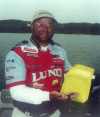
Click
here to Check out the New Leech Tamer and order online













Promotional
Team Favorites
Lodging food and more






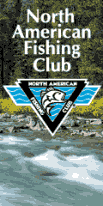


|
Gain Control with Drift
Socks
By Bart Rosen
Over the years anglers have always used tools that help or assist
them to catch more fish. One of the toughest challenges an angler
must face is how to control his boat and its speed. Boat control
is one of the key components to successful angling. Through out the
past two decades, anglers have been trying to create devices that will
help them achieve this. One idea that has been used is the concept
of resistance. One device that uses resistance is called a drift
sock.
Drift socks have been used mostly for drifting applications.
Now that they have become a common tool among fisherman, anglers are finding
new applications and other accessories to help assist their drift socks.
A drift sock is a cone-shaped under water windsock, similar to those
used at airports to detect changes in wind direction. Drift Control
sea anchors aid boat control in two ways. First, they slow your drift
in strong winds. Secondly, you can use them to fine-tune subtle boat
maneuvers in rough seas or heavy current.
Most anglers who fish large expansive lakes or rivers carry a
sea anchor with them daily. Usually, one sea anchor is adequate for most
boats and conditions. But, if you have a large boat and the sea anchor
isn't doing the job you may need a large one off the front cleat and a
smaller one at the stern.
When fishing alone in a console boat in heavy winds, I troll
headlong into the wind with a sea anchor tied at the bow of the boat.
By letting out about 8 feet of rope, the bag trails next to the console.
I can yank it out of the water with a safety cord if I need, to without
getting out of my seat and I never lose control of the boat.
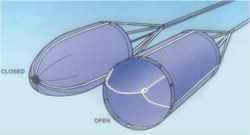 |
Only Sea Anchor Fully adjustable from boat
Easy To Retrieve
Inflates in seconds every time
No Tangling or Spinning
Control Speed of drift within boat
Make another pass without retrieving
|
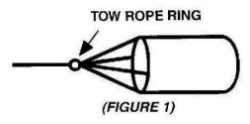
You will need two ropes approximately 3/8" in diameter. Attatch
1 rope to tow rope |
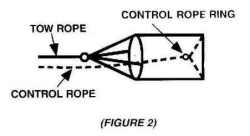
Run the other rope through the cylinder between the upper and lower
tow straps Do not run the rope through the tow rope ring |
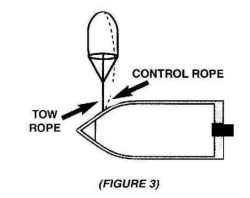
When placing in the water make sure the control rope is longer than
the tow rope |
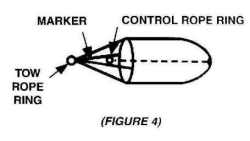
To deploy pull the control rope ring towards the marker on the upper
tow strap. Do not pull the control rope ring past the marker or you
will pull it inside out |
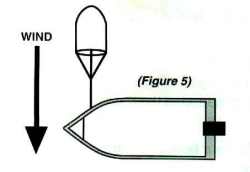
Drift Control slows drift and stabilizes boat. Tie the sock near
the bow of the boat to decrease drift speed. Minimize side to side
stability . You'll fish deeper with less weight and at the speed
you desire |
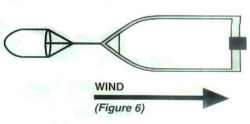
Makes backtrolling more precise. tie the sock to the bow to prevent
swaying. You will enhance boat control and fish your pattern not
the winds. If your motor fails in high winds tie the sock to the
bow using a long tow rope and increase your safety by keeping the bow headed
into the wind |
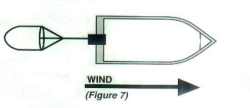 |
Use with you bow mounted electric trolling motor by tying to the stern
of the boat. This adds more precise boat control and allows you to
follow the contour of the shoreline or hold on structure Click
Here to order on-line |
That maybe all right if you want to slow down your presentation, but control
is still very important and you have to be able to control your presentation
if you want the fish to bite. One way that I approach control is
by tying a drift sock at the bow of the boat and then backtrolling along
a contour depth. By tying a Drift Control sea anchor at the bow of
the boat it will hold the bow down and reduces splashing for backtrolling
into the wind. This control will even allow me to swim a lightweight
Phelps half-faced jig over the rocks and keep my boat pointed in the direction
I want to go, rather than the way the wind wants to push me.
One of the devices that you can add to your Drift Control sea
anchor is a harness buoy. The harness buoy attaches to your Drift
Control sea anchor with durable attachment devices and has a highly visible
float that allows your drift sock to ride higher in the water. If
you have a large fish boat side, you can easily release the clips and the
bag will float away, preventing entanglement. It will not sink with
the harness buoy instead it will be visible to retrieve the floating drift
sock. The Harness Buoy when attached to the Drift Control sea anchor
and your boat, can easily be used as a device for retrieval back into the
boat as well.
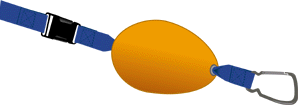
Drift Sock Harness Buoy
|
Drift Sock
Harness Buoy, provides a multiple attachment system, allowing
an angler simple and effective placement in varying conditions.The strap
is made of a 2 inch nylon strap,heavy-duty quick release clip, high visibility
styrofoam float, and a carabineer."This Harness Buoy is an attachment system
for use with any Drift Sock!" |
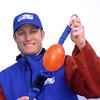 |
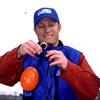 |
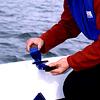 |
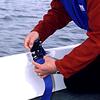 |
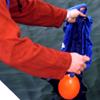 |
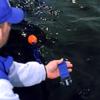 |
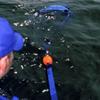 |
This unique system allows for quick detachment of the drif sock in
the event a fish starts to go in it yet you are able to retrieve the bag
and harness later as it floats Click
here to order on line |
The big keys to vertical jigging properly are boat position and
speed, line
attitude, jig weight, and being able to detect strikes. All of those
factors are intertwined, so it’s difficult to separate one from the other
without affecting the whole.
Vertical jigging also makes it easier to fish a small area, such
as a brushpile, hump or other structure. You can often cast to within
5 feet of such an area and not get hit, but put your lure in it and you
immediately come up with a fish.
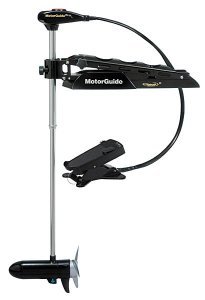
MotorGuide
Tour Edition |
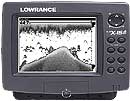
Lowrance’s
new X-15
My favorite technique is to use my MotorGuide
trolling motor to stay in a specific place. Finding a good spot,
I’ll mark it with a buoy. Then, using my trolling motor and depthfinder
I’ll slowly work my way around the area. I will also use my MotorGuide
trolling motor and my Lowrance depthfinder to locate fish vertically along
an edge such as an old creek or river channel.
|
Bass fishing has virtually exploded over the last few years. In the
early season it is not uncommon to find smallmouth bass in good numbers
along the rock, and shale reefs of the islands that dot many northern lakes.
Boat control is as essential when fishing for bass as it is for walleyes.
As many anglers know, fish are usually most active near the windblown shore,
but presenting a bait to them can prove a trial. Anchoring limits
you to a single spot when the fish may be someplace else or spread along
the breakline, and short wind drifts have you motoring, casting and reeling
most of the time. Bass anglers therefore, want to slow down their
presentation and not be blown off breaklines. Here again the Drift
Control sea anchor is used.
By tying off two Drift Control sea anchors to the windward side
of the boat the boat drifts perpendicular to the contour or breakline.
Occasionally the bow mount trolling motor will correct the drift or in
some circumstances the kicker motor will have to be nudged into gear to
compensate for gusty winds.
Contour trolling is something that I really enjoy. Contour trolling
will allow you to present your bait right in front of the walleye.
In cold front conditions this is essential. What you're trying to
do is stay on a particular depth, or contour, where it looks like the walleyes
are holding.
To really slow down and follow the contours I use the Drift Control
Sea Anchor tied off the bow or starboard side of the boat. This acts
like a brake and if I have to keep the rpm’s up a little on my kicker or
big motor it still gives me control to make an inside curve or to allow
the lure to track evenly behind the boat on the contour.
Sometimes on large lakes or western reservoirs when the wind is really
stiff I will attach two Drift Control sea anchors, one to each cleat off
the bow section both starboard and port. This will increase my control
and allow me to run my engine at higher rpm’s to combat the waves.
If I want to jig a productive area for walleyes the Drift Control sea
anchor comes in handy here also. It gives me control over the stern
of my boat so I can fish a given contour perpendicularly. By attaching
the Drift Control to the stern cleat adjacent to the current it gives me
a brake that slows down the drift of the back end of my boat and I can
correct the angle with the bow mount trolling motor. I can also attach
another one to the same side of boat in the bow giving me more drag and
a slower presentation when I vertically jig this contour.
The Drift Control sea anchors most common use remains controlled drifting.
But given time and usage with this product, anglers will begin to understand
the other functions. Next time that you are out fishing, experiment
with one of these applications, "throw it out" and see how you can also
gain control with drift socks!
Fish
Clix Banner Exchange
Walleyes Inc. website is maintained
by Randy
Tyler Fishing the In-Fisherman Professional Walleye Circuit, Masters
Walleye Circuit and the Wal Mart RCL Circuit. All rights reserved.Copyright
1999/2003
Please visit these site sponsors
Daiichi/Tru-Turn Hooks,
Lindy
Little Joe,
R-A.M Mounting Systems,
Ranger
boats, Mercury Outboards,Bedford
Sales , Church Tackle, Panther
Marine Products,
Webfoots body sock,
Bait
Rigs Tackle ,Dual Pro Charging Systems,
Daiwa
Rods and Reels,
Driftcontrol
Wind socks,
Trojan Batteries
|




















